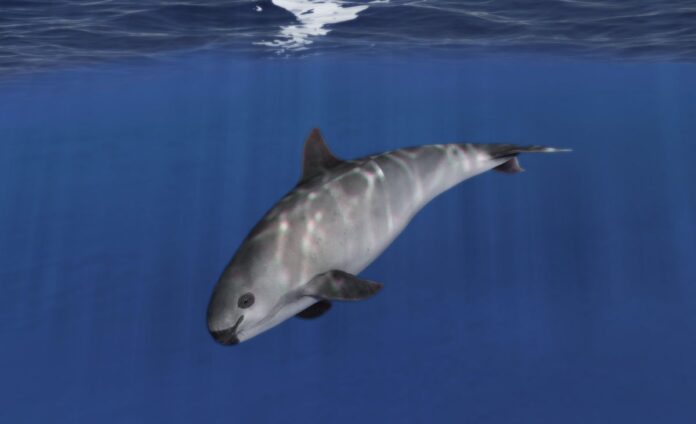November 6, 2025
2 min read
A Flicker of Hope for the World’s Rarest Porpoise
The latest report shows that the estimated number of endangered vaquita porpoises has modestly increased
A lone vaquita, Phocoena sinus, in the open sea.
For the first time since researchers have been tracking the vaquita, the estimated number of individuals of this nearly extinct species of porpoise has increased.
Vaquitas, found only in a 4,000-square-kilometer area of the upper Gulf of California, wedged between Baja California and the Mexican mainland, have been dwindling since a 1997 high of 567 individuals; computer models indicate the population may have decreased by 80 percent between 2011 and 2015. Despite projections that they’d be extinct by 2021, the vaquita is persevering.
A new survey that was conducted over several weeks in September by the Mexican government in collaboration with the nonprofit Sea Shepherd Conservation Society estimates that the population consists of seven to 10 individuals and at least one or two new calves. These numbers, up from 2024’s estimate of six to eight total individuals, reflect a glimmer of hope in what has otherwise been a tragic tale of decline.
On supporting science journalism
If you’re enjoying this article, consider supporting our award-winning journalism by subscribing. By purchasing a subscription you are helping to ensure the future of impactful stories about the discoveries and ideas shaping our world today.
The increase offers “a reason for cautious optimism,” says Catalina López-Sagástegui, a marine biologist and director of the Gulf of California Marine Program at the nonprofit development organization Institute of the Americas, who was not involved in the survey.“It underscores the urgency of creating the conditions necessary to improve [the vaquita’s] chances of survival.”
Historically, local shrimp fishers accidentally caught the small porpoises in gill nets, inadvertently killing them. Vaquitas continued to be caught and unintentionally killed when fishers used these nets to target totoaba fish for their swim bladder—the part of a fish that regulates buoyancy—for sale in Chinese black markets. Although gillnets were permanently banned in the Gulf of California in 2017, they continued to be used illegally.
To confront vaquita declines, in 2019 the Convention on International Trade in Endangered Species established an agreement to help eliminate supply and demand for totoabas and help remove gill nets from the upper Gulf of California. It also established a zero-tolerance area in the vaquita’s range in which fishing is banned, causing a massive uproar from members of the fishing community, who would be forced out of their historical fishing grounds—and often out of their livelihood.
Among the vaquitas spotted this September were an individual called Frida and her calf. The calf appeared to be about a year old, meaning Frida’s baby has survived the most perilous part of its life. “This is hope in action,” says Heidy Martinez, a marine biologist at the Sea Shepherd Conservation Society.
It’s Time to Stand Up for Science
If you enjoyed this article, I’d like to ask for your support. Scientific American has served as an advocate for science and industry for 180 years, and right now may be the most critical moment in that two-century history.
I’ve been a Scientific American subscriber since I was 12 years old, and it helped shape the way I look at the world. SciAm always educates and delights me, and inspires a sense of awe for our vast, beautiful universe. I hope it does that for you, too.
If you subscribe to Scientific American, you help ensure that our coverage is centered on meaningful research and discovery; that we have the resources to report on the decisions that threaten labs across the U.S.; and that we support both budding and working scientists at a time when the value of science itself too often goes unrecognized.
In return, you get essential news, captivating podcasts, brilliant infographics, can’t-miss newsletters, must-watch videos, challenging games, and the science world’s best writing and reporting. You can even gift someone a subscription.
There has never been a more important time for us to stand up and show why science matters. I hope you’ll support us in that mission.



